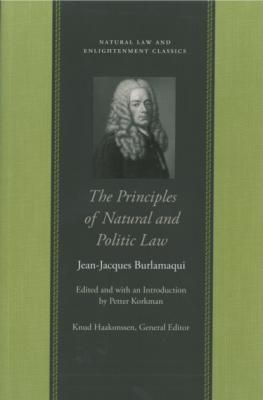ТОП просматриваемых книг сайта:
The Principles of Natural and Politic Law. Jean-Jacques Burlamaqui
Читать онлайн.Название The Principles of Natural and Politic Law
Год выпуска 0
isbn 9781614871835
Автор произведения Jean-Jacques Burlamaqui
Жанр Философия
Серия Natural Law and Enlightenment Classics
Издательство Ingram
CHAPTER II
Continuation of the principles relative to the nature of man. Of will and liberty.
Sect. 1. The will. What happiness and good consists in.
Sect. 2. Instincts, inclinations, passions.
Sect. 3. Liberty: in what it consists.
Sect. 4. Use of liberty in our judgment with respect to truth.
Sect. 5. Liberty has its exercise, even in regard to things that are evident.
Objection.
Answer.
Sect. 6. Use of liberty with regard to good and evil.
Sect. 7. With regard to indifferent things.
Sect. 8. Why the exercise of liberty is restrained to non-evident truths, and particular goods.
Sect. 9. [Section number is missing in Nugent text.]
Sect. 10. The proof of liberty drawn from our inward sense, is superior to any other.
Sect. 11. How comes it that liberty has been contested.
Sect. 12. Actions are voluntary, and involuntary; free, necessary, and constrained.
Sect. 13. Our faculties help one another reciprocally.
Sect. 14. Of reason and virtue.
Sect. 15. Causes of the diversity we observe in the conduct of men.
Sect. 16. Reason has it always in her power to remain mistress.
CHAPTER III
That man thus constituted, is a creature capable of moral direction, and accountable for his actions.
Sect. 1. Man is capable of direction in regard to his conduct.
Sect. 2. He is accountable for his actions: they can be imputed to him.
Sect. 3. Principle of imputability. We must not confound it with imputation.
CHAPTER IV
Further inquiry into what relates to human nature, by considering the different states of man.
Sect. 1. Definition. Division.
Sect. 2. Primitive and original states. 1. State of man with regard to God.
Sect. 3. 2.State of society.
Sect. 4. 3.State of solitude. 4. Peace: war.
Sect. 5. State of man with regard to the goods of the earth.
Sect. 6. Adventitious states. 1. Family. 2. Marriage.
Sect. 7. 3.Weakness of man at his birth. 4. Natural dependance of children on their parents.
Sect. 8. The state of property.
Sect. 9. Civil state and government.
Sect. 10. The civil state and property of goods give rise to several adventitious states.
Sect. 11. True idea of the natural state of man.
Sect. 12. Difference between original and adventitious states.
CHAPTER V
That man ought to square his conduct by rule; the method of finding out this rule; and the foundation of right in general.
Sect. 1. Definition of a rule.
Sect. 2. It is not convenient, that man should live without a rule.
Sect. 3. A rule supposes an end, an aim.
Sect. 4. The ultimate end of man is happiness.
Sect. 5. It is the system of providence.
Sect. 6. The desire of happiness is essential to man, and inseparable from reason.
Sect. 7. Self-love is a principle that has nothing vicious in itself.
Sect. 8. Man cannot attain to happiness but by the help of reason.
Sect. 9. Reason is therefore the primitive rule of man.
Sect. 10. What is right in general?
CHAPTER VI
General rules of conduct prescribed by reason. Of the nature and first foundation of obligation.
Sect. 1. Reason gives us several rules of conduct.
Sect. 2. First rule. To make a right distinction between good and evil.
Sect. 3. Second rule. True happiness cannot consist in things inconsistent with the nature and state of man.
Sect. 4. Third rule. To compare the present and the future together.
Fourth rule.
Fifth rule.
Sect. 5. Sixth rule. To give the goods that excel most the preference.
Sect. 6. Seventh rule. In some cases possibility only, and for a much stronger reason probability, ought to determine us.
Sect. 7. Eighth rule. To have a relish for true goods.
Sect. 8. Our mind acquiesces naturally in those maxims, and they ought to influence our conduct.
Sect. 9. Of obligation generally considered.
Sect. 10. Obligation may be more or less strong.
Sect. 11. Dr. Clark’s opinion on the nature and origin of obligation.
Sect. 12. Monsieur Barbeyrac’s opinion concerning this subject.
Sect. 13. Two sorts of obligations; internal and external.
CHAPTER VII
Of right considered as a faculty, and of the obligation thereto corresponding.
Sect. 1. The word right is taken in several particular senses, which are all derived from the general notion.
Sect. 2. Definition of right, considered as a faculty.
Sect. 3. We must take care to distinguish between a simple power, and right.
Sect. 4. General foundation of the rights of man.
Sect. 5. Right produces obligation.
Sect. 6. Right and obligation are two relative terms.
Sect. 7. At what time man is susceptible of right and obligation.
Sect. 8. Several sorts of rights and obligations.
CHAPTER VIII
Of law in general.
Sect. 1. [Section number is missing in Nugent text.]
Sect. 2. As man by nature is a dependent being, the law ought to be the rule of his actions.
Sect. 3. Definition of law.
Sect. 4. Why law is defined a rule prescribed.
Sect. 5. What is understood by a sovereign, sovereignty, and the right of commanding.
CHAPTER IX
Of the foundation of sovereignty, or the right of commanding.
Sect. 1. First remark. The question is, in regard to a necessary sovereignty.

